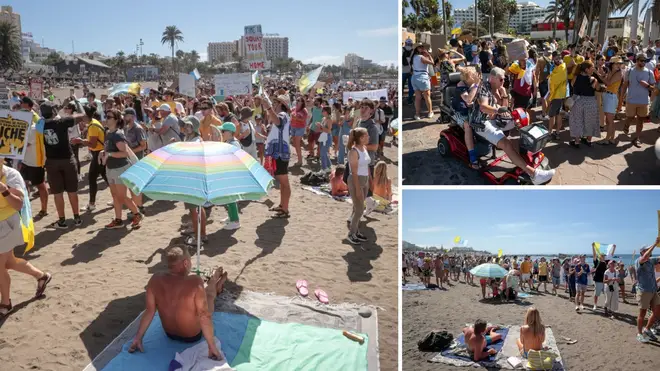British tourists are increasingly avoiding Spain as a series of anti-tourist demonstrations spreads across popular destinations. According to a recent survey, holidaymakers are concerned about safety, disruptions, and the growing tension between locals and visitors.
Spain has long been a top choice for British travelers, known for its sunny beaches, historic cities, and vibrant nightlife. But recent protests in cities like Barcelona, Palma de Mallorca, and Ibiza have shifted perceptions. Demonstrators have expressed frustration at overcrowding, rising rents, and the strain of mass tourism on local infrastructure.
The survey reveals that a growing number of British travelers are now considering alternative destinations. Greece, Portugal, and parts of Eastern Europe are emerging as popular options for 2025, offering similar climates and experiences without the heightened risk of public demonstrations.
Travel experts say the trend is partly fueled by media coverage highlighting confrontations between tourists and locals. Videos and reports of protestors blocking beaches, disrupting transport, or staging public rallies have created a perception that holidaymakers are unwelcome. While the majority of Spain remains safe, the visibility of protests is enough to influence booking decisions.
Tour operators confirm a measurable drop in inquiries for traditional Spanish hotspots. Hotels and resorts report slower bookings, particularly in areas prone to demonstrations. Some businesses have responded by emphasizing safety measures, staff training, and communication with guests, but uncertainty persists.
Local authorities in affected regions have expressed concern. Tourism is a vital part of Spain’s economy, contributing significantly to employment and revenue. Officials warn that prolonged disruption could impact not only international visitors but also local communities reliant on tourism income. Measures to mitigate tensions, including better visitor management and dialogue with local residents, are being explored.
The protests reflect broader challenges facing mass tourism in Europe. Many cities are struggling with overcrowding, environmental pressures, and rising costs for residents. Anti-tourist sentiment has grown in response to these pressures, sparking campaigns that range from peaceful demonstrations to calls for restrictions on short-term rentals.
Travel industry analysts note that British holidaymakers are particularly sensitive to these trends. Safety and comfort are priorities, and destinations perceived as hostile to visitors are losing appeal. The shift in travel patterns is prompting tour operators to diversify offerings and highlight alternative European destinations.
Despite the challenges, Spain remains popular for some visitors. Many resorts are unaffected by protests, and urban destinations with managed tourist flows continue to welcome international guests. However, the overall perception of Spain as a safe and welcoming destination is being tested.
The survey also indicates that younger travelers are more likely to change plans in response to demonstrations. Social media amplifies information about protests, influencing decisions and shaping public opinion. Older travelers tend to rely on traditional sources, but the cumulative effect of negative coverage is noticeable across all demographics.
Hotel owners and local businesses are adjusting marketing strategies to reassure potential visitors. Campaigns emphasize safety, community engagement, and respectful travel practices. Authorities are also working to educate tourists about cultural norms and local concerns to reduce friction and maintain Spain’s appeal.
Economists warn that continued decline in British visitors could have wider implications for Spain’s economy. Retail, hospitality, transport, and entertainment sectors are closely linked to international tourism. A sustained drop in arrivals could affect jobs and regional development, particularly in cities heavily dependent on seasonal visitors.
For now, British travelers are making choices based on perceived safety and comfort. The rise of anti-tourist demonstrations is prompting a reconsideration of long-established holiday habits, potentially reshaping European tourism patterns for years to come.
The survey’s findings underscore the delicate balance between tourism and community life. As cities seek to manage growth while welcoming visitors, holidaymakers are exercising caution, illustrating how social dynamics can directly influence travel trends.


